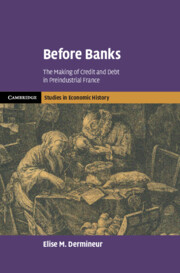
- Coming soon
- Publisher:
- Cambridge University Press
- Expected online publication date:
- January 2025
- Print publication year:
- 2025
- Online ISBN:
- 9781009502634

This innovative work delves into the world of ordinary early modern women and men and their relationship with credit and debt. Elise Dermineur focuses on the rural seigneuries of Delle and Florimont in the south of Alsace, where rich archival documents allow for a fine cross-analysis of credit transactions and the reconstruction of credit networks from c.1650 to 1790. She examines the various credit instruments at ordinary people's disposal, the role of women in credit markets, and the social, legal, and economic experiences of indebtedness. The book's distinctive focus on peer-to-peer lending sheds light on how and why pre-industrial interpersonal exchanges featured flexibility, diversity, fairness, solidarity and reciprocity, and room for negotiation and renegotiation. Before Banks also offers insight into factors informing our present financial system and suggests that we can learn from the past to create a fairer society and economy.
‘This brilliantly researched book takes you right to the heart of the fabric of credit-based social relations in the French villages of the Ancien Régime, where everyone was both a lender and a debtor. It follows their disintegration from the 1760s onwards, and shows that ancient practices based on trust and solidarity still coexist in many parts of today's world with modern institutionalized and depersonalized forms of credit.’Laurence Fontaine, Paris Sciences et Lettres
‘In wonderful and compelling detail, Elise Dermineur traces out the social embeddedness of credit in early modern France. Her study combines social science analysis with rich historical evidence to show how, long before the emergence of a modern banking system, communities were knit together by financial relationships. Constrained by laws and shaped by social norms, credit transactions could produce both solidarity and conflict. Anyone seeking historical insight into today’s financialized economy, or the fascinating connections between gender and credit, will find much of value here.’Bruce G. Carruthers, Northwestern University
‘This lively and well-documented account of credit in early modern France is a timely reminder that it is possible to have financial systems with what Dermineur labels "human-oriented features." She documents the conditions under which processes embedded in the personal relationships of a community can be effective and what happens when they are eroded by institutionalization and marketization. Dermineur's book is a significant contribution to a growing literature on credit and debt, borrowing and lending. By excavating the past, she provides tools by which to create a better present.’Margaret Levi, Stanford University
‘In this compelling empirical study of the world of borrowing and lending in two Alsatian rural communities, Elise Dermineur adds to the rich and widespread body of research on credit and debt. With exceptional clarity, she interweaves a micro-historical cross-analysis of credit transactions between ordinary people with the historiography. This is also essential reading for today and shows we need to rethink our current world of credit and banking, which is completely detached from society.’Janine Maegraith, Newnham College, Cambridge
 Loading metrics...
Loading metrics...
* Views captured on Cambridge Core between #date#. This data will be updated every 24 hours.
Usage data cannot currently be displayed.